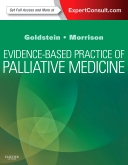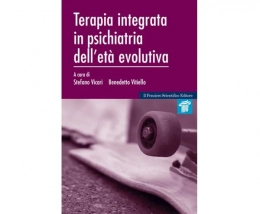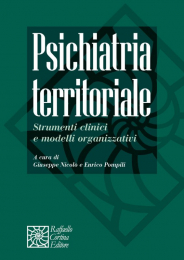Non ci sono recensioni
| Description | |
|
Evidence-Based Practice of Palliative Medicine is the only book that uses a practical, question-and-answer approach to address evidence-based decision making in palliative medicine. Dr. Nathan E. Goldstein and Dr. R. Sean Morrison equip you to evaluate the available evidence alongside of current practice guidelines, so you can provide optimal care for patients and families who are dealing with serious illness. |
| Author Info | |
| By Nathan E Goldstein, MD, Associate Professor , Director of Research, Hertzberg Palliative Care Institute , Brookdale Department of Geriatrics and Palliative Medicine, Mount Sinai School of Medicine; Geriatrics, Research, Education and Clinical Center, James J. Peters VA Medical Center, New York, New York and R. Sean Morrison, MD, Director, National Palliative Care Research Center , Director, Hertzberg Palliative Care Institute, Hermann Merkin Professor of Palliative Medicine , Brookdale Department of Geriatrics and Palliative Medicine, Mount Sinai School of Medicine; Geriatrics, Research, Education and Clinical Center, James J. Peters VA Medical Center, New York, New York |
Table of Contents:
SECTION I SYMPTON MANAGEMENT
PAIN
1 How should opioids be started and titrated in routine outpatient settings?
2 How should opioids be started and titrated in hospital or inpatient settings?
3 How should patient-controlled analgesia be used in patients with serious illness and those experiencing postoperative pain?
4 How should opioids be used to manage pain emergencies?
5 What principles should guide oral, transcutaneous, and intravenous opioid dose conversions?
6 Which opioids are safest and most effective in renal failure?
7 How should methadone be started and titrated in opioid naïve and opioid-tolerant patients?
8 What special considerations should guide the safe use of methadone?
9 When should corticosteroids be used to manage pain?
10 When should nonsteroidal antiinflammatory drugs be used to manage pain?
11 What is Neuropathic Pain? How do opoids and nonopoids compare for neuropathic pain management?
12 Should bisphosphonates be used routinely to manage pain and skeletal complications in cancer?
13 Should bisphosphonates be used routinely to manage pain and skeletal complications in other conditions?
14 When should radiotherapy be considered for pain management and what principles should guide the consideration of limited-fraction versus full-dose radiotherapy?
15 When should radiopharmaceuticals be considered for pain management?
16 What principles should guide the prescribing of opioids for non-cancer-related pain?
17 What approaches should be used to minimize opioid diversion and abuse in palliative care?
18 When should epidural or intrathecal opioid infusions and pumps be considered for pain management?
19 When should nerve blocks be used for pain management?
DYSPNEA
20 What interventions are effective for managing dyspnea in cancer?
21 What is the role of opoids in treatment of refractory dyspnea in advanced COPD?
22 What nonopioid treatments should be used to manage dyspnea associated with COPD?
23 What interventions are effective for managing dyspnea in heart failure?
GASTROINTESTINAL
24 What medications are effective in preventing and relieving constipation in the setting of opioid use?
25 How should medications be initiated and titrated to reduce acute and delayed nausea and vomiting in the setting of chemotherapy?
26 How should medications be initiated and titrated to prevent and treat nausea and vomiting in clinical situations unrelated to chemotherapy?
27 What interventions are effective for relieving acute bowel obstruction in cancer and other conditions?
ANOREXIA, CACHEXIA, AND FEEDING DIFFICULTIES
28 What medications are effective in improving anorexia and weight loss in cancer?
29 What therapeutic strategies are effective in improving anoerexia and weight loss in nonmalignant disease?
30 When should enteral feeding by percutaneous tube be used in patients with cancer and in patients with non-cancer-related conditions?
31 When should parenteral feeding be considered for patients with cancer and for patients with non-cancer-related conditions?
PSYCHIATRIC SYMPTOMS
32 How does one assess for psychiatric illness in patients with advanced disease?
33 What treatments are effective for depression in the palliative care setting?
34 What treatments are effective for anxiety in patients with serious illness?
DELIRIUM
35 What is delirium?
36 What pharmacological treatments are effective for delirium?
37 What nonpharmacologic treatments are effective for delirium?
38 What are the differences when treating a patient at the end of life with delirium (terminal delirium)?
SYMPTOMS AT THE END OF LIFE
39 How do symptoms change for patients in the last days and hours of life?
SECTION II COMMUNICATION
PROGNOSTICATION
40 What is known about prognostication in advanced or serious illness?
41 What is a useful strategy for estimating survival in palliative care settings for persons with advanced cancer?
42 What is a useful strategy for estimating survival for persons with advanced non-cancer-related illness in palliative care settings?
SETTING GOALS AND COMMUNICATING SERIOUS NEWS
43 What are the key elements to having a conversation about setting goals and communicating serious news?
44 What do palliative care clinicians need to know about teaching communication?
ADVANCE CARE PLANNING
45 What are advance care plans and how are they different than advance directives?
46 What elements are essential to effective advance care planning?
47 What is the evidence that advance care plans change patient outcomes?
SECTION III DISEASE-SPECIFIC TOPICS
CANCER
48 What is the role for palliative care in patients with advanced cancer?
49 What is the clinical course of advanced cancer?
50 What is the relationship between patient performance status and ability to offer chemotherapeutic treatments?
DEMENTIA
51 What is the clinical course of advanced dementia?
52 What are appropriate palliative interventions for patients with advanced dementia?
ADVANCED LIVER DISEASE
53 What is the clinical course of advanced liver disease and what symptoms are associated with it?
54 What special considerations are needed for treating patients with chronic liver disease?
BRAIN FUNCTION
55 What is the Role of Palliative Care in Stroke?
56 What special considerations are needed for individuals with amyotrophic lateral sclerosis, multiple sclerosis, or Parkinson Disease?
HEART FAILURE
57 What is the clinical course of advanced heart failure and how do implanted cardiac devices alter this course?
CHRONIC CRITICAL ILLNESS
58 What is chronic critical illness and what outcomes can be expected?
HEAD AND NECK CANCER
59 What special considerations are needed in patients with head and neck cancer?
END-STAGE RENAL DISEASE
60 What special considerations are needed in treating symptoms in patients with end-stage renal disease?
61 How is the patient who stops dialysis best managed?
62 Which patients with end-stage renal disease should not be started on dialysis?
FRAILTY
63 What is frailty?
64 What are the special needs of patients with frailty?
PEDIATRICS
65 What are special considerations for treating pediatric patients and their families?
SECTION IV SPECIAL TOPICS
PALLIATIVE CARE EMERGENCIES
66 What are the signs and symptoms of spinal cord compression?
67 What are the best pharmacological and surgical treatments for patients with spinal cord compression?
68 What techniques can be used in the hospital or home setting to best manage uncontrollable bleeding?
69 What can be done for patients with crisis dyspnea?
FINANCIAL ASPECTS OF PALLIATIVE CARE
70 What are the arguments that show that palliative care is beneficial to hospitals?
71 What are the arguments that show that outpatient palliative care is beneficial to medical systems?
CAREGIVERS
72 What is the effect of serious illness on caregivers?
73 What can be done to improve outcomes for caregivers of patients with serious illness?
74 What is prolonged grief disorder and how can its likelihood be reduced?
MODELS FOR DELIVERING PALLIATIVE CARE
75 What are the eligibility criteria for hospice?
76 In what settings can hospice be provided?
77 What models exist for delivering palliative care/hospice in nursing homes?
78 How can palliative care be integrated into home-based primary care programs?
79 What new models exist for ambulatory palliative care?
80 What new models exist for palliative care in the emergency department?
SPIRITUAL CARE
81 What are sources of spiritual and existential suffering for patients with advances disease?




